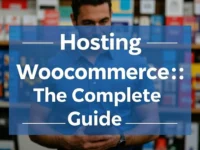The opportunity to start an online business has never been more accessible or profitable. With the rise of e-commerce and digital platforms, more entrepreneurs are shifting their focus online. According to a 2024 report from Statista, over 2.14 billion people worldwide are expected to purchase goods and services online. This reflects the continuous surge in global e-commerce, showcasing the vast potential for online businesses.
Looking back, in 2018, the global e-commerce market was valued at $2.8 trillion and was projected to grow to nearly $5 trillion by 2021. This early data shows how rapid the online market’s growth has been, and it provides a clear indication of why now is the perfect time to step into the world of online business.
The digital world offers unmatched flexibility, scalability, and access to a global market. Whether you plan to sell products, offer services, or build a unique online presence, the rewards are undeniable. In this article, we’ll explore expert tips to help you start an online business successfully, from identifying a profitable niche to implementing effective digital marketing strategies.
- 1. How to Start An Online Business?
- 2. Identify Your Niche and Target Market
- 3. Create a Business Plan
- 4. Choose a Business Name and Register It
- 5. Build Your Website
- 6. Develop Your Brand
- 7. Leverage Digital Marketing
- 8. Manage Finances Effectively
- 9. Test and Launch
- 10. Monitor Performance and Adapt
- Resources to Start An Online Business
- FAQ – Start An Online Business
1. How to Start An Online Business?
Starting an online business is an exciting and rewarding venture, but it requires careful planning and execution. Online businesses offer unprecedented flexibility, remote work, and low startup costs. Morever, there are multiple digital business models for aspiring entrepreneurs.
The first step is to securely decide what kind of digital business model (e.g., eCommerce, content writer, SEO agency, and much more) you want to manage online. Make your decision based on your personality traits, budget, willingness to learn, and other factors. While profitability varies based on factors like niche, market conditions, location, and the business’s execution, we can look at general trends and industry data for different business models to give you an idea of which are often more profitable.
For example, e-commerce sites that sell physical products generally return a profit margin of 5% to 20% after costs, while selling digital products yields a profit margin of 60% to 90% (due to the lack of physical inventory costs). Successful affiliate marketers (especially in high-ticket niches like finance, technology, or health) can generate significant income with relatively low upfront costs, but the average profit margins are between 10% and 50% (commission-based earnings).
SEO agencies have average profit margins of 30% to 50%, particularly if they can scale and manage a client base effectively.

2. Identify Your Niche and Target Market
One of the most important steps when you start an online business is identifying your niche and target market. A successful online business starts with a clear understanding of the problems your product or service will solve. By narrowing down your focus, you can cater to a specific audience, making it easier to stand out in a crowded market.
Find a Problem to Solve
Niche research is essential when you decide to start an online business. Online forums, social media groups, and keyword tools are valuable resources for uncovering market gaps. By researching what people are talking about, you can identify the problems they face, especially those that lack adequate solutions. This allows you to tailor your business idea to address those unmet needs, creating a product or service that resonates with your target audience.
Understanding your niche also gives you the advantage of positioning yourself as an expert in a specific area. This can lead to stronger customer loyalty and better marketing opportunities, which is crucial when you start an online business.
Credits: Scaleo
Validate Your Idea
Once you’ve pinpointed a potential market, it’s essential to validate your idea before committing to a full-scale launch. Testing your concept through customer feedback or small trials can provide valuable insights into whether your business idea is viable. You can use surveys, focus groups, or even test the waters with a minimal viable product (MVP) to gauge interest and collect feedback. Ensuring there is genuine demand is crucial when you start an online business, as it helps minimize risks and improves your chances of long-term success.
By validating your idea early, you can refine your product and approach before investing significant time and resources. This process gives you confidence that you’re heading in the right direction when you start an online business.
3. Create a Business Plan
Developing a comprehensive business plan is essential when you start an online business. It serves as a strategic roadmap, guiding your decisions and helping you navigate the complexities of the digital marketplace. A well-structured plan not only clarifies your business objectives but also attracts potential investors by demonstrating the viability and potential of your venture.
Define Your Business Goals
Establishing clear, measurable goals is crucial when you start an online business. These objectives should align with your target audience’s needs and the market landscape. Setting specific goals enables you to:
- Clarify Your Vision
- Allocate Resources Effectively
- Measure Progress
Articulating your business aspirations provides direction and purpose, ensuring all efforts are aligned towards a common objective.
Understanding your goals allows for strategic distribution of resources, optimizing operational efficiency and impact.
Defining clear goals facilitates the tracking of achievements and identification of areas needing improvement, fostering continuous growth.
Include Key Digital Strategies
Integrating effective digital marketing strategies into your business plan is vital for reaching and engaging your target audience. Essential tactics include:
- Search Engine Optimization (SEO)
- Social Media Marketing
- E-commerce Platforms
- Email Marketing
- Influencer Collaborations
Optimizing your website content enhances visibility on search engines, driving organic traffic and increasing brand exposure.
Leveraging platforms like Facebook, Instagram, and LinkedIn allows you to connect with your audience, build community, and promote your products or services effectively.
Utilizing e-commerce solutions streamlines the buying process, offering customers a seamless and secure shopping experience, which is crucial when you start an online business.
Building an email list enables direct communication with your customers, allowing for personalized promotions, updates, and relationship-building efforts.
Partnering with influencers can amplify your brand’s reach and credibility, tapping into established audiences to drive engagement and sales.
Incorporating these digital strategies into your business plan ensures a comprehensive approach to market penetration and customer engagement, setting a solid foundation for success as you start an online business.
4. Choose a Business Name and Register It
When you start an online business, one of the first steps you’ll take is selecting a business name. Your business name is a crucial element of your brand identity, as it sets the tone for how customers perceive your business. A strong, memorable name will help you stand out in the digital marketplace and create a lasting impression.
Select a Memorable Business Name
Creating a unique and memorable business name is essential when you start an online business. Your name should reflect the nature of your business and resonate with your target audience. Consider factors like ease of pronunciation, spelling, and relevance to your niche. A catchy, simple name that’s easy to remember can make a significant difference in how potential customers find and connect with you online.
Additionally, it’s important to check for domain name availability. As you start an online business, you’ll likely want to create a website for your business, so ensuring that the domain name corresponding to your business name is available is a critical step. A matching domain name not only strengthens your brand identity but also makes it easier for customers to find you online.
Legalities
Once you’ve decided on your business name, it’s time to handle the legalities of registering your business. This step is necessary to ensure that your business is recognized as a legitimate entity. When you start an online business, you’ll need to register your business with the appropriate authorities, which may vary based on your location and the structure of your business.
In addition to registration, securing any necessary licenses or permits is essential to operate legally. Depending on the type of business you’re starting, you might need specific certifications or licenses, particularly if you plan to sell regulated products or services. Taking care of these legal requirements early on can help ensure a smooth and compliant start when you start an online business.
5. Build Your Website
When you start an online business, having a professional and user-friendly website is crucial for attracting and retaining customers. Your website will be the foundation of your online presence, and its design plays a significant role in the user experience and overall success of your business.
Keep It Simple
The design of your website should prioritize simplicity. A clean layout with easy navigation and fast loading speeds is essential for ensuring that visitors have a positive experience. Studies show that 47% of users expect a webpage to load in two seconds or less, and 40% will abandon a website if it takes more than three seconds to load (Neil Patel). Keeping the design simple helps users find what they need quickly, reducing bounce rates and increasing engagement.
For beginners looking to start an online business, there are several website builders that can simplify the process. Platforms like Wix, Shopify, and Squarespace offer drag-and-drop functionality, allowing you to create a professional website without any coding experience. These builders also offer customizable templates that are optimized for speed and functionality, making it easier for you to launch your business online.
Optimize for Mobile
In today’s mobile-first world, optimizing your website for mobile devices is critical. In 2023, over 60% of global web traffic came from mobile devices (Statista), making mobile responsiveness a key factor for online success. When you start an online business, ensure that your website is designed to work seamlessly on smartphones and tablets, providing users with a consistent experience across all devices.
Mobile optimization not only improves user experience but also boosts your search engine ranking. Google now uses mobile-first indexing, meaning it primarily uses the mobile version of your site to determine search rankings. Ensuring your website is mobile-friendly is a necessary step for long-term success when you start an online business.
Set Up E-commerce Features
If you plan to sell products online, setting up e-commerce features is essential. A good online store should include secure payment gateways, clear product pages with high-quality images, and a seamless checkout process. According to Statista, 73% of online shoppers say that a poor checkout experience is one of the main reasons they abandon their cart (Statista).
When you start an online business, make sure your website includes the following e-commerce features:
- Payment Gateways
Offer secure options like PayPal, Stripe, or credit card payments to ensure safe transactions.
- Product Pages
Include detailed descriptions, clear images, and customer reviews to provide buyers with all the information they need.
- Easy Checkout
Keep the checkout process simple and quick, reducing friction and making it easy for customers to complete their purchase.
By focusing on simplicity, mobile optimization, and strong e-commerce features, you’ll create a website that not only attracts customers but also helps convert them into loyal buyers as you start an online business.
6. Develop Your Brand
When you start an online business, developing a strong brand identity is crucial to differentiate yourself from competitors and establish a connection with your target audience. Your brand is more than just a logo or color scheme—it’s how your customers perceive your business and the experience they have with it.
Build a Strong Brand Identity
Creating a memorable and cohesive brand identity is essential when you start an online business. This includes designing a logo that represents your business values and choosing colors that align with the emotions you want to evoke. According to recent studies, color can increase brand recognition by up to 80% (University of Loyola).
In addition to your logo and colors, crafting messaging that resonates with your target audience is key. Make sure your tone of voice, values, and mission align with the interests and needs of the people you’re trying to reach. When you start an online business, consistency across all your platforms—website, social media, and marketing materials—helps reinforce your brand’s identity, making it more recognizable and trustworthy.
Use Storytelling
Storytelling has become an incredibly powerful tool for brands looking to connect emotionally with their audience. When you start an online business, consider incorporating storytelling into your brand’s narrative. People tend to connect more with stories than with just facts or product features. By sharing the story behind your business, the challenges you’ve faced, and your mission, you build authenticity and trust.
Studies show that stories are up to 22 times more memorable than facts alone (Stanford Graduate School of Business). By using storytelling, you can humanize your brand, making it easier for customers to relate to and engage with your business. Whether you share customer success stories, the journey of your brand’s creation, or how your product or service helps solve problems, storytelling strengthens the emotional bond with your audience as you start an online business.
By building a strong brand identity and using storytelling to connect with your customers, you can create a business that not only stands out but also fosters loyalty and trust from your audience when you start an online business.
7. Leverage Digital Marketing
Digital marketing is essential when you start an online business, as it allows you to reach a broader audience, drive traffic to your website, and ultimately grow your customer base. By utilizing key digital marketing strategies, you can enhance your online presence and increase sales. Below are some of the most effective methods to leverage when launching an online business.
Search Engine Optimization (SEO)
SEO is a crucial component of digital marketing when you start an online business. Optimizing your website content helps improve your search engine rankings, which makes it easier for potential customers to find you. In 2023, 53% of all website traffic comes from organic search, underlining the importance of SEO for any online business (Statista).
To succeed with SEO, focus on keyword optimization, creating high-quality content, and obtaining backlinks from reputable websites. Researching the right keywords related to your business and incorporating them strategically throughout your website and blog posts can help increase your visibility on search engines like Google, driving more organic traffic and improving your online presence as you start an online business.
Social Media Marketing
Social media marketing is another powerful tool for promoting your business and engaging with customers. When you start an online business, platforms like Instagram, Facebook, LinkedIn, and Twitter provide the perfect space to build a loyal community around your brand. In 2023, social media ad spending reached $60 billion globally, showing how vital social media has become for business growth (Statista).
Use these platforms to interact with your audience, share valuable content, and run targeted ads. Create posts that reflect your brand’s personality, engage with followers through comments and messages, and run promotions or giveaways to boost your reach. Consistent, authentic engagement on social media will help you grow your business’s visibility and customer loyalty.
Email Marketing
Email marketing remains one of the most effective ways to convert visitors into customers when you start an online business. In 2023, the average ROI for email marketing was $36 for every $1 spent (DMA), proving its importance as a tool for business growth. Building an email list is essential to maintain direct communication with your audience.
Offer value through incentives such as discounts, free resources, or exclusive content to encourage visitors to sign up for your email list. Regularly send newsletters with updates, promotions, and personalized content to keep your subscribers engaged and encourage repeat business. By nurturing your email list, you can turn one-time visitors into loyal customers as you start an online business.
Leveraging digital marketing strategies such as SEO, social media marketing, and email marketing is essential for scaling your online business. When you start an online business, these strategies will help you build an audience, attract traffic, and turn that traffic into customers.
8. Manage Finances Effectively
Managing finances effectively is one of the most critical steps when you start an online business. Proper financial management ensures your business stays profitable, avoids unnecessary expenses, and supports sustainable growth. Here are key tips to help you manage your finances from the start.
Separate Business and Personal Finances
When you start an online business, it is essential to separate your personal and business finances. This helps maintain clarity in financial tracking and simplifies tax filing. According to a recent QuickBooks survey, 70% of small businesses that keep their personal and business finances separate report higher financial organization and fewer tax-related issues .
Opening a dedicated business bank account ensures that your business expenses are easily identifiable. It also protects your personal assets and makes it easier to track your business’s cash flow, helping you avoid financial pitfalls as your online business grows.
Credits: Psico-Smart
Track Expenses
Tracking your expenses is key to managing finances effectively when you start an online business. Using accounting software, such as QuickBooks or Xero, allows you to track your income and expenses efficiently, reducing the chances of overspending and improving financial health. A recent study by Small Business Trends found that 74% of successful small businesses use accounting software to track their finances.
Alternatively, hiring a professional accountant or bookkeeper can help you stay on top of your finances. These experts can help ensure that your financial records are accurate, assist with budgeting, and provide insights into your business’s financial health. This way, you can make informed decisions and avoid unnecessary financial stress as you start an online business.
By separating your business and personal finances and actively tracking your expenses, you lay the groundwork for long-term financial success. When you start an online business, staying organized and proactive with your finances will help ensure you can focus on growing and scaling your business.
9. Test and Launch
Before you start an online business, it’s crucial to ensure your website functions flawlessly and meets user expectations. This involves comprehensive testing and a strategic launch approach.
Test Your Website
Conducting a thorough review of your website before launch is essential to identify and resolve potential issues. Key areas to focus on include:
- Performance Testing
Assess how your website performs under various conditions, including load times and responsiveness, to ensure a smooth user experience.
- Security Testing
Verify that your website is protected against potential threats, safeguarding user data and maintaining trust.
- Cross-Browser Compatibility
Ensure your website displays and functions correctly across different browsers, providing a consistent experience for all users.
- Mobile Responsiveness
Optimize your website for mobile devices, considering the significant portion of users accessing sites via smartphones and tablets.
- User Experience (UX) Testing
Evaluate the usability of your website, ensuring intuitive navigation and a positive overall experience for visitors.
Soft Launch
Launching your website to a limited audience before the official release offers several advantages:
- Risk Reduction
A soft launch allows you to identify and address potential issues in a controlled environment, minimizing risks associated with a full-scale launch.
- Gathering Feedback
Collecting insights from early users helps refine your website based on real-world usage and preferences.
- Building Anticipation
Generating buzz among a select group can create excitement and anticipation for the official launch.
- Resource Efficiency
Soft launches can be more resource-efficient, allowing you to focus on gathering feedback and making improvements before a full-scale release.
10. Monitor Performance and Adapt
Monitoring the performance of your online business is essential to understanding how well your strategies are working and where improvements are needed. When you start an online business, continuously tracking performance and making data-driven decisions is crucial to long-term success. Here’s how you can effectively monitor and adapt your business strategies.
Track Performance Using Analytics
One of the most powerful tools for tracking the performance of your online business is Google Analytics. As of 2023, over 90% of websites worldwide use Google Analytics to track website traffic and customer behavior (Statista). When you start an online business, using such tools helps you monitor key metrics like website traffic, bounce rates, and user behavior patterns.
By setting up goals and monitoring conversions, you can identify what’s working well and what needs optimization. Whether it’s adjusting your landing page for better engagement or improving your marketing strategies based on visitor data, tools like Google Analytics provide the insights needed to make informed decisions.
Credits: Clutch
Continuous Improvement
Once you’ve gathered data, the next step is to use it for continuous improvement. In 2023, businesses that optimize their strategies based on data-driven insights see 3x more growth compared to those that don’t (McKinsey). When you start an online business, refining your marketing tactics, product offerings, and website design is essential for improving user experience and increasing conversions.
Whether it’s experimenting with A/B testing, adjusting SEO strategies, or tweaking your content marketing efforts, the key is to constantly evolve based on the data you receive. Regular performance reviews and adaptability are necessary to ensure your business stays competitive and can grow steadily.
By utilizing analytics and continuously refining your strategies, you position your online business for success. When you start an online business, this cycle of monitoring and adapting will ensure you can address challenges and seize opportunities as your business scales.

Resources to Start An Online Business
We encourage you to take action with confidence! Remember, every successful online business started with someone just like you taking that first step. Have questions or want to share your journey?
Feel free to leave a comment below — we’d love to hear your thoughts! Explore these resources to dive deeper into each topic and further equip yourself to start an online business successfully!
Starting an online business requires access to quality resources that can guide you through the process. Here are some widely recognized platforms that can help you launch and grow your online business:
- Shopify
Shopify offers an easy-to-use platform to create and manage an online store. It provides a range of tools to set up e-commerce businesses, including payment solutions and inventory management.
- U.S. Small Business Administration (SBA)
The SBA provides essential resources and guides on how to start a business, including financial assistance, business planning, and legal information for entrepreneurs.
- WordStream
WordStream helps businesses succeed in digital marketing by offering tools for managing pay-per-click (PPC) advertising and increasing online visibility through SEO strategies.
- Hostinger
Hostinger is a top-tier web hosting company offering web hosting, domain registration, email hosting, and website builders, to help businesses create and manage their online presence.
FAQ – Start An Online Business
How to succeed in an online business?
To succeed when you start an online business, focus on creating value, understanding your audience, and using effective marketing strategies like SEO and social media. Continuously improve your products and services as you start an online business for sustained growth.
How do I take my small business online?
To take your small business online and start an online business, create a website, set up e-commerce platforms, and use digital marketing. Leverage social media and search engine optimization to increase visibility as you start an online business.
How to start an online business from home?
Starting an online business from home is simple with a reliable internet connection, a good business idea, and planning. Use platforms like Shopify or Etsy to sell products. When you start an online business from home, ensure a dedicated workspace to stay productive.
How to start an online business with no money?
To start an online business with no money, utilize free platforms like social media, blogs, and website builders. Focus on low-cost marketing strategies like content marketing and affiliate marketing. It’s possible to start an online business with little to no initial investment.
What’s the best online business to start as a beginner?
The best online business to start as a beginner includes affiliate marketing, dropshipping, or selling digital products. These businesses have low startup costs and can be easily managed. If you want to start an online business, choose something that aligns with your interests and skills.





















0 Comments